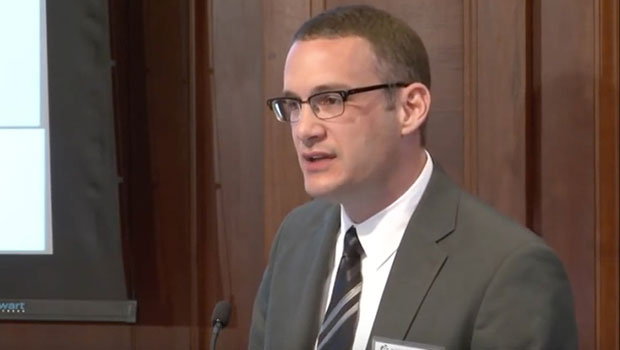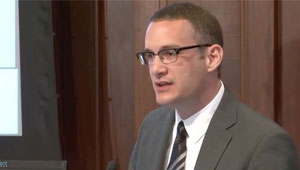Bariatric surgery pros & cons—Why Group Health research matters

David Arterburn, MD, MPH, GHRI Senior Investigator
Dr. David Arterburn talks about his studies with Kaiser Permanente and other systems to help a rapidly increasing population with severe obesity
Group Health Research Institute Senior Investigator David Arterburn, MD, MPH, has eight studies—four of which he leads—on the impact of bariatric surgery. These stomach-reducing procedures restrict how much people eat and change how the gut communicates with the brain and other organs. But what are the long-term effects on weight loss, mental health, cancer risk, diabetes, blood pressure, and kidney disease? In his conversation with GHRI Scientific Editor Chris Tachibana, PhD, he describes how his work attempts to find answers.
Why is bariatric surgery getting attention and funding right now?
Dr. Arterburn: For a couple of reasons. Although U.S. obesity rates are beginning to plateau, the group of people with severe obesity—body mass index over 35, generally 75 or more pounds overweight—continues to grow rapidly. For these people, their weight has a major impact on quality of life, daily functions, and health. It’s also a big contributor to care costs.
Bariatric surgery gets attention because there’s not strong evidence that behavior and lifestyle adjustments or drug treatments change weight enough to improve quality of life and health. Few people can do it with diet and exercise alone over the long term. We’re studying who bariatric surgery is best and safest for in the long term with collaborators like Dr. Karen J. Coleman at Kaiser Permanente Southern California Department of Research & Evaluation.
Another reason people are interested in bariatric surgery is its dramatic impact on health. For most people, diabetes improves rapidly, sometimes while they’re still in the hospital after surgery, so improvements are related to something other than weight. Figuring this out could lead to less invasive treatments that mimic the effects of bariatric surgery.
What are the common goals of your projects?
Dr. Arterburn: Our main goal is informing patient and provider decisions. We want to understand whether the beneficial effects, like weight loss, are durable and for whom. We also want to know the risks.
What’s groundbreaking about your projects?
Dr. Arterburn: We’re studying the long-term risks and benefits of bariatric surgery in an efficient way, using existing data on patients who had the surgery in the last 10 to 15 years. Prospective studies that follow people over time are prohibitively expensive, especially for rare outcomes. For example, suicide attempts or developing alcohol misuse are pretty rare, but early data say this might happen more often in people who had bariatric surgery than people who didn’t. But we need to look at a very large population to know.
We need big data to understand the characteristics of patients, procedures, and health care systems that affect bariatric surgery outcomes. We’re working with integrated care systems like Group Health and Kaiser in Northern and Southern California, Oregon, Hawaii, and Colorado. We have partners in the Health Care Systems Research Network and the Veterans Administration. Each has a large population with severe obesity who didn’t have bariatric surgery so we can track outcomes for people who did and did not get surgery.
Our collaboration with Dr. Coleman, in particular, is a unique opportunity. The Southern California population has over 40 percent racial/ethnic minorities. With that diversity, our findings will be meaningful to people across the country.
We recently started a Patient-Centered Outcomes Research Network (PCORnet) study on long-term outcomes from bariatric surgery with more than 60 medical centers across the United States. With that kind of geographic diversity and size—more than 60,000 patients who had bariatric surgery—we hope to learn much more about how well different bariatric procedures work and if some groups of patients are best suited to certain procedures.
GHRI’s strength in these partnerships is our proven expertise and leadership in studies with multisite data. GHRI has the programmers, biostatisticians, analysts, and other scientists who know how to do these large, complex, multisite studies and get results to inform treatment decisions.
Why so many different projects?
Dr. Arterburn: Severe obesity and bariatric surgery affect nearly every organ system. Modern bariatric procedures appear to have effects beyond just weight loss—most are positive, but some are not. For example, we’re starting what will be the largest and longest study to date to simultaneously examine long-term weight loss and regain, surgical complications, and changes in blood pressure and kidney disease, comparing people with severe obesity who did and did not have bariatric surgery.
Focusing on kidney disease is novel because bariatric surgery was not thought to have a dramatic impact on it. But preliminary data suggests that kidney disease may improve with major weight loss. That’s important because now, we can only do few things for people with chronic kidney disease. If they have severe obesity, bariatric surgery might reduce the risk of needing dialysis or a kidney transplant.
We’re also interested in knowing how durable the effects of bariatric surgery are on high blood pressure. If high blood pressure returns, is it related to a weight regain or just a function of age?
What does the future of obesity research and treatment look like to you?
Dr. Arterburn: We need to improve the efficacy and durability of lifestyle and behavioral interventions. Most people don’t want to have bariatric surgery because it permanently changes the way you eat and your relationship with food. Fortunately, we have excellent researchers like Drs. Dori Rosenberg and Paula Lozano studying what works other than surgery for people and families with obesity.
We need to understand what health care systems can do to support people with obesity—what works in the long-term and is cost effective. Our work will help inform policies about bariatric surgery and improve shared decision making about these procedures.
Dr. Arterburn’s current obesity research is supported by the National Cancer Institute, the National Institute of Diabetes and Digestive and Kidney Diseases, the National Institute of Aging, and the Patient-Centered Outcomes Research Institute.
Live Healthy

Healthy Weight
Read our Live Healthy articles with research-backed info to help you maintain a healthy weight.

Group Health Research News Feb. 2016
In this issue
-
Bariatric surgery pros & cons—Why Group Health research matters
-
Tough conversations: How can we help patients get off risky drugs?
-
Group Health’s new lung cancer screening program shows promise
-
Is a picture worth 1,000 words if patients don’t understand it?
-
‘You’re never more creative’: New directors Paula Lozano and Diana Buist
-
Better together: Dyad structure is key in health departments’s success


